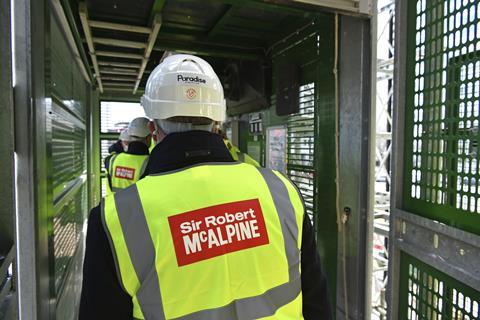Neil Martin is expected to ring the changes and take the blue-blooded contractor back to centre-stage. Dave Rogers reports

When Neil Martin said that he was leaving Lendlease last year, having spent most of his career with the firm, former colleagues didnŌĆÖt think it would be too long before he would be back in the industry.
ŌĆ£He knows the sector and heŌĆÖs good at construction,ŌĆØ says one. ŌĆ£HeŌĆÖs well-liked among the construction guys and I think itŌĆÖs a really good move for them.ŌĆØ
The ŌĆ£themŌĆØ in question, of course, is one of the industryŌĆÖs grand names, Sir Robert McAlpine.
While itŌĆÖs difficult right now to describe any contractor as blue-chip ŌĆō possibly with the exception of Morgan Sindall given its reliability to turn in healthy profits ŌĆō McAlpine is certainly blue-blooded, with a rich heritage and years-long traditions.
One first-time attendee at its recent Christmas party was caught off guard when his full name, including prefix, was introduced to the throng, town crier-style. ŌĆ£The MC looked at my name badge and the next moment I was being introduced to the crowd. It was a bit of surprise.ŌĆØ
Two decades ago, Sir Robert McAlpine took action against Alfred McAlpine ŌĆō Alfred was the son of Robert ŌĆō over the latterŌĆÖs move to drop Alfred from its name and become McAlpine. Alfred was deemed a bit too old-fashioned for a modern support services firm, as it had morphed into back then, and under the plan a new purple lozenge logo was drawn up. Alfred was dropped and the relaunch went ahead with minimal warning to Robert the change was coming.
McAlpine went to court, arguing that people would confuse the two. The hearing, which lasted for several days at the High Court on the Strand, eventually resulted in a victory for Sir Robert and Alfred was given just a few weeks to rebrand all over again. It was attended every day by the late Malcolm McAlpine, grandson of Robert. He would arrive at court in a McAlpine green London cab.
But firms, no matter how grand or historic, can lose their way and there has been a growing feeling that the contractor which built the Bloomberg building and, further back, the Emirates stadium, has been missing a beat these past few years.
ŌĆ£TheyŌĆÖve lost their way a bit,ŌĆØ says one consultant. ŌĆ£In London, McAlpine was good at complex projects. They were famous for problem-solving, a family-friendly builder. Now they do random projects and weŌĆÖre not sure what theyŌĆÖre about.
ŌĆ£ItŌĆÖs not uncommon for firms to lose their way, but they need to re-energise the business. ItŌĆÖs a good appointment. He [Martin] has a track record, a good reputation and heŌĆÖs probably still got the hunger.ŌĆØ
Martin, who turns 57 in April, has been brought in to replace Paul Hamer, who was in charge for seven years.
Hailing from Saddleworth in Greater Manchester, Hamer came from White Young Green, the listed consultant bought by US firm Tetra Tech in 2019, having spent nine years there. Before that he had roles at British Nuclear and Costain.
Last year, he announced a major rejig at the company which saw the firm swapping a previous regional focus for a sector-based one. It caused some head-scratching in the industry.

ŌĆ£Neil will get rid of that weird model they brought in last year,ŌĆØ says a former colleague of MartinŌĆÖs. ŌĆ£I think that will get kicked into the long grass.ŌĆØ
Another rival is blunter. ŌĆ£If I were Neil, my first speech would be my easiest: Rip everything up and get back to basics.ŌĆØ
Martin held a Teams meeting with staff on his first day last Monday and has been touring offices and sites, which include its Museum of London rebuild and Ritz hotel revamp, with chair Ed McAlpine in his first week. A company spokesperson says: ŌĆ£Neil brings the essential skills and experience required to lead our business, with a clear focus on project selection and excellence in delivery.ŌĆØ
No doubt many will be wondering whether last yearŌĆÖs rejig is to be junked after just a matter of months. Some think it inevitable that it will be.
ŌĆ£McAlpine had a strong regional business,ŌĆØ one former staffer explains. ŌĆ£Sectors donŌĆÖt work. For them, it should be a simple, relationship model structure.
ŌĆ£Sectors create a lot of mini heads, lots of little fiefdoms. ItŌĆÖs difficult to grow sectors, especially when you have lots of firms already established in them.ŌĆØ
ŌĆ£It will be interesting to see whether Neil returns the business to a geographic, rather than sector, based structure,ŌĆØ one firm says. ŌĆ£It will also be interesting to see whether he sticks with infrastructure or returns to the traditional SRM heartlands of the private sector.
ŌĆ£The challenge is that both markets are very mature and you need to be at the top of your game across the board to be successful. SRM have been a little off the pace of late so will have a job on their hands with both to be frank. Neil will also need a good deal of support from across the family.ŌĆØ
Another firm adds: ŌĆ£ItŌĆÖs all about relationships. ItŌĆÖs quite simple, really. They have to give key clients confidence going forward and hopefully they get back to what they do best. [The change] needed to happen, in my view.ŌĆØ
Some expect Martin to go back to Lendlease and try and poach staff. He was originally in charge of the construction business before being given a wider brief in summer 2019 when he was promoted to chief operating officer for Lendlease Europe, which also took in its developments and investment arms.
ŌĆ£He was good on construction but out of his comfort zone with the development and investment side,ŌĆØ a former colleague says. ŌĆ£This job is perfect for him.
ŌĆØI wouldnŌĆÖt be surprised if he tried to pick up some of the Lendlease project guys. He surrounded himself with good people there. He connects well with the construction guys.ŌĆØ
Hamer was considered by some to be too remote and too often based at his home in Cheshire, which perplexed some, certainly those working in London.
ŌĆ£Neil is a fairly straightforward fellow. You can have a laugh with the man,ŌĆØ says another colleague. ŌĆ£He knows the construction models and is a good advocate for it. He thinks contractors are the ones who pick up the risk and then get the rap. He thinks thatŌĆÖs unfair.ŌĆØ
>> See also: In Business: Where McAlpine sees its future
One senior figure at a rival firm remembers that, within the first few days of starting a new role, he received a couple of messages of support. ŌĆ£Two people sent me congratulations and he was one of them,ŌĆØ he adds.
ŌĆ£HeŌĆÖs a proper builder. He has got a good profile in the industry. He gets out. Paul wasnŌĆÖt really like that. I was surprised he lasted so long given that he didnŌĆÖt really do all the glad-handing stuff.ŌĆØ

Hamer, a Manchester City fan, left with the best wishes of McAlpine but everyone knows that firms donŌĆÖt bring in replacement chief executives for more of the same.
As well as working out what to do with a restructure he has inherited ŌĆō and one that McAlpine said last summer had already cost it more than ┬Ż8m ŌĆō other issues in MartinŌĆÖs in-tray include dealing with the cost of finishing jobs which the firm said last year would be up to ┬Ż33m more than it expected because of delays and inflation.
One of these is believed to be the 21 Moorfields scheme in the City, which was finally handed over to fit-out contractor ISG last September, 18 months late.

Also on his to-do list is lifting morale at the business, which has seen several senior figures go among wider job cuts. ŌĆ£They used to be fairly stable but theyŌĆÖve seen a few people go the past couple of years,ŌĆØ says one industry source.
Around 40 roles went last spring with the initial rejig and then more people were put on consultation towards the end of last year, with back-office roles the latest understood to have been affected at the tun of the year.
ŌĆ£People were coming off big jobs and being put onto consultation,ŌĆØ says one source with knowledge of the situation. ŌĆ£[MartinŌĆÖs] got quite a lot of work to do and it wonŌĆÖt happen overnight. He needs to instil positivity at McAlpine ŌĆō but having him there is a start.ŌĆØ


























No comments yet